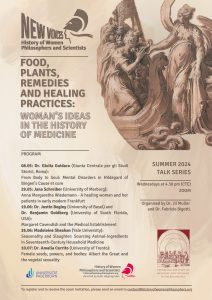 On Wednesday May 8th, at 4.30 pm we are pleased to hear Dr. Giulia Guidara on From Body to Soul: Mental Disorders in Hildegard of Bingen’s Cause et cure
On Wednesday May 8th, at 4.30 pm we are pleased to hear Dr. Giulia Guidara on From Body to Soul: Mental Disorders in Hildegard of Bingen’s Cause et cure
The Cause et cure of Hildegard of Bingen (1098-1179) is both a cosmological text and a medical handbook. This double aspects, so to speak, of the work is not surprising: in medieval Europe human beings and nature are deeply interconnected. As the title Cause et cure suggests, most of the work focuses on the causes and natural treatment of several diseases. Hildegard’s idea of disease is very different from the present one: sickness always derives from a physiological change of the body. The reference framework is the humoral theory, according to which the four humors, or bodily fluids, (i.e. blood, phlegm, yellow bile and black bile) affect temperament, physical qualities and health. However, some diseases described in the Cause et cure mainly affect mood and behaviour and, in this regard, they can be assimilated to the modern concept of mental disorders. Indeed, the DSM-5 of the American Psychiatric Association (that is the reference book for mental health and brain-related conditions) defines mental disorder as a behavioural or psychological syndrome or pattern, which is characterized by an important disturbance in an individual’s cognition, emotion regulation, or behaviour. My lecture will analyse the passages of Cause et cure devoted to diseases that affect mood and behaviour, with a special focus on their causes and their possible treatment. This allows to highlight both Hildegard’s ideas on the relationship between soul and body, and medieval concept of mental illness.
This Summer Term Talk Series 2024 is organised by Dr. Jil Muller, Deputy of the Center for the History of Women Philosophers and Scientists, in cooperation with Dr. Fabrizio Bigotti, director of the Center for the Study of Medicine and the Body in the Renaissance.
Everyone is welcome to attend.
To register and to receive the zoom invitation, please send an email to contact@historyofwomenphilosophers.org
If you want to read up on Women Philosophers in Europe on Science check out the fourth Volume of our Springer Book Series.
Women, Philosophy and Science sheds light on the originality and historical significance of women’s philosophical, moral, political and scientific ideas in Italy and early modern Europe. Divided into three sections, it starts by discussing the women philosophers’ engagement with the classical inheritance with regard to the works of Moderata Fonte, Tullia d’Aragona and Anne Conway. The next section examines the relationship between women philosophers and the new philosophy of nature, focusing on the connections between female thought and the new seventeenth- and eighteenth-century science, and discussing the work of Camilla Erculiani, Margherita Sarocchi, Margaret Cavendish, Mariangela Ardinghelli, Teresa Ciceri, Candida Lena Perpenti, and Alessandro Volta. The final section presents male philosophers’ perspectives on the role of women, discussing the place of women in the work of Giordano Bruno, Poulain de la Barre and the theories of Hobbes and Rawls. By exploring these women philosophers, writers and translators, the book offers a re-examination of the early modern thinking of and about women in Italy.
sheds light on the originality and historical significance of women’s philosophical, moral, political and scientific ideas in Italy and early modern Europe. Divided into three sections, it starts by discussing the women philosophers’ engagement with the classical inheritance with regard to the works of Moderata Fonte, Tullia d’Aragona and Anne Conway. The next section examines the relationship between women philosophers and the new philosophy of nature, focusing on the connections between female thought and the new seventeenth- and eighteenth-century science, and discussing the work of Camilla Erculiani, Margherita Sarocchi, Margaret Cavendish, Mariangela Ardinghelli, Teresa Ciceri, Candida Lena Perpenti, and Alessandro Volta. The final section presents male philosophers’ perspectives on the role of women, discussing the place of women in the work of Giordano Bruno, Poulain de la Barre and the theories of Hobbes and Rawls. By exploring these women philosophers, writers and translators, the book offers a re-examination of the early modern thinking of and about women in Italy.
You cannot copy content of this page








